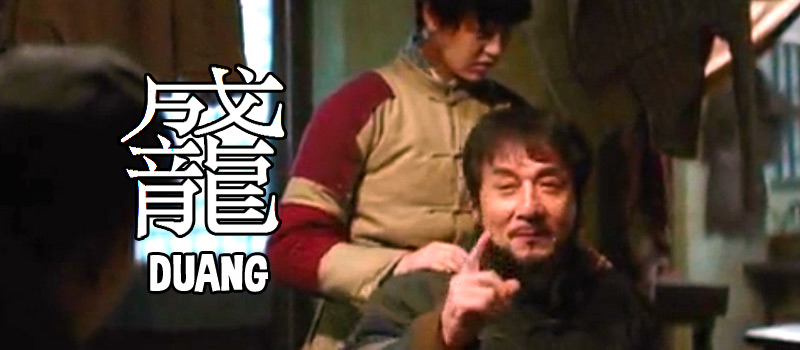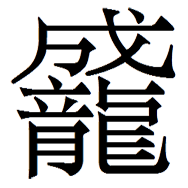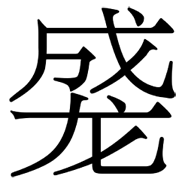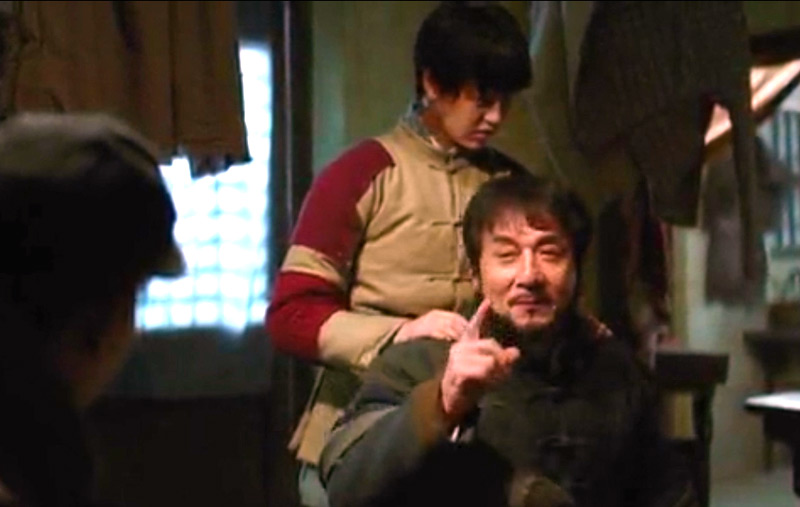
Duang! – How Jackie Chan went viral and invented a new Chinese character
At the beginning of the 80s, stuntman Jackie Chan became a superstar. With the success of his films, his name alone was also marketed. Over the years, he has been an advertising medium for a wide variety of brands. At that time, however, nobody was aware of the lasting success of a bad shampoo advertisement from 2004.
Even if Jackie Chan rose from a superstar in Asia to a global megastar long before 2004, he always remained true to his homeland and supported local products, inventions and talents. The Bawang company asked the actor to help promote a shampoo – and Jackie Chan became a hair testimonial.
Bawang Shampoo commercial
In the commercial, which was shot in the manner of an infomercial, Jackie Chan explains the benefits of this shampoo in Chinese. In fact, it’s not only supposed to be good for hair care, no, according to the manufacturer, it even supports hair growth. What at first sounds like read off in the explanations of the Kung Fu legend is ironically only topped by Jackie Chan’s talent for improvisation.
“… after a film shoot, computer effects are being added, the hair – DUANG! – becomes black, silky, shiny and delicate.”
Jackie Chan
What was that? Duang? That’s not a real word! Duang is Jackie Chan’s onomatopoeia for the sound of popping hair. You don’t say … But this Chinese onomatopoietic neologism did not contribute to the success of Bawang Shampoo.
Jackie Chan goes viral thanks to social media
For a long time, it was quiet around Bawang and Duang. It wasn’t until the beginning of March 2015 that people heard again about the controversial shampoo, which in the meantime was even suspected of being carcinogenic. A user had re-cut the commercial at the time and added a song to it. He had specially emphasized the sound on the word Duang. What didn’t exist in 2004 quickly went viral in 2015 thanks to social media.
The new video was uploaded to the Chinese video platform Bilibili on February 20, 2015. The song used is called “My Skate Shoes” (我 的 滑板 鞋). The message of this remix video is different from the original. In the video, Jackie Chan claims that he has no hair at all; this is cut with multiple DUANGS:
“After a month of work with computer effects, the hair does – DUA-A-A-NG! – even though I knew they weren’t real because of all the chemicals. Now, I add a few computer effects every day … actually a lot of effects … and the hair does DUANG DUANG DUANG – the hair is robust and shiny again.”
Jackie Chan
As early as 2010, the Chinese company Bawang was suspected of having added chemicals to its shampoo that are carcinogenic. In a matter of days, the video was shared and talked about so many times that the term “duang” appeared over 8 million times on the Chinese microblogging website Weibo, a Twitter equivalent, with over 312,000 comments from 15,000 users. Even in the Chinese search engine Baidu, a Google equivalent, the word was searched 600,000 times.
What does Duang actually mean?
But that’s not all. “Duang” has not only become a viral internet phenomenon, it has also quickly settled in the youth’s everyday language. Everyone wanted to know what it means. While there is no obvious meaning, there has been a lot of discussion on Weibo. In the meantime, two meanings have established themselves in everyday language usage:
- as a reinforcing adjective as in “that’s super sweet”, where super becomes “Duang”
- Duang is figuratively equated with the expression “equipped with computer effects”
Since the word “Duang” is not protected by law, many other companies, including Bawang himself, used the term to advertise their products. Even the Chinese government was involved. This allowed the use and distribution of the word “Duang”, even if in the past, thanks to the tough censorship in China, code words were often blacklisted.
Officially, “Duang” is not a word and therefore cannot be written with its own character. But the fans of Jackie Chan and “Duang” showed their own initiative and created the characters themselves without further ado. It consists of the characters for Cheng Long, which are arranged one below the other, paying tribute to their creator – because Jackie Chan’s Chinese name is Cheng Long (pronounced Sing Lung in Cantonese).

(Sing Lung in Cantonese)

(Cheng Long in Mandarin)
Jackie Chan himself was very surprised by the effect of his duang, but was happy that his compatriots felt so much joy and creativity and announced more great films for his fans in the future. It wasn’t just said that way, Jackie Chan kept his word and a surprise in store for all who recognized it.
Duang as an easteregg in Jackie Chan’s films
[SPOILERS]
It shouldn’t take long before Jackie Chan took advantage of the success of his own, if unwanted, fame of the word Duang. In the 2016 film “Skiptrace” with Johnny Knoxville, the word does not appear in the film itself, but in the Chinese music video with Jackie Chan.
This colourful firework of Chinese pop music is based on the song “So Transparent Is My Heart” (明明 白白 我 的 心) from 1992, which is sung in a duet by Sarah Chen and Jackie Chan on his album “The First Time” and is still today considered a famous song in China. In the film “Skiptrace” the character of Johnny Knoxville has to “fight” his way through a street festival and to the astonishment of Jackie Chan’s character sings this song.
A nice marketing gag that immediately led to a new edition of the song when the film was released in China. In the video, DUANG is emblazoned on the wall in the background. There are matryoshka dolls that look like Jackie Chan, and dozens of well-known film characters from Jackie Chan’s blockbusters dancing in competition.
DUANG also finds its place in the 2016 film “Railroad Tigers”, which was released a few months later. Here, Jackie Chan and a team of tough rebels have to blow up a bridge. His son Jaycee Chan is also on board. In a scene in preparation for the demolition, the following dialogue takes place:
“Wait a minute. How do you use the [explosives]?” (Jaycee Chan)
“Well, it’s very simple. We throw the package on the bridge – DUANG DUANG – it explodes. ” (Jackie Chan)
“Duang?” (All others)
Jackie Chan even incorporates a gesture here by tossing his hair off his face and smiling mischievously. If that isn’t a nice, subtle easteregg by the actor.

[END OF SPOILERS]
The German dubbing of the film did everything right! Jackie Chan likes to make fun of himself here and holds “Duang” on an international level for eternity. We can be curious to see in which future films this expression will pop around our ears like popped hair in the original commercial from 2004.